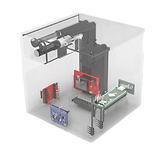
Platforms for
microGravity Research
MAIDANA RESEARCH is at the forefront of innovation in microgravity research, developing modular experimental settings called microLabs. Our microLabs provide a versatile platform for conducting cutting-edge science and engineering activities under microgravity conditions. In this section, we will introduce the concept of microgravity research, highlight the significance of our microLabs, and showcase the integrated scientific payload.


Understanding microgravity research
Microgravity, or the condition of very weak gravitational forces, offers a unique environment that allows us to study physical and biological phenomena without the interference of gravity-related effects. In microgravity, processes and behaviors that are masked or overshadowed by gravity on Earth become more apparent and can be better understood. This opens up a world of opportunities for scientific exploration and technological advancements. By conducting experiments in microgravity, we can:
-
Gain insights into fundamental physical and chemical processes
-
Discover new materials and substances with unique properties
-
Investigate the behavior of biological systems in altered gravitational conditions
-
Improve manufacturing processes and technologies
Introducing the microLabs
Our microLabs are modular experimental settings designed to facilitate microgravity research across a wide range of scientific and engineering domains. With their standardized interfaces and connectors, the microLabs offer flexibility, adaptability, and scalability, allowing researchers to easily configure and combine different modules for specific experiments and missions.
Key features of our microLabs include:
-
Modularity: Easily adaptable to different research objectives and experiments - Compact Design: Integrated into a 2U enclosure for efficient space utilization
-
Rapid Deployment: Allows for quick integration with the International Space Station (ISS) and other microgravity platforms
-
High-Quality Manufacturing: Utilizes state-of-the-art 3D printing technologies for precise and reliable production
-
Power Management and Distribution: Seamlessly connects the microLabs to the main enclosure through a USB port, simplifying power distribution and control
The microLabs in its versions 1.0 and 1.2 are ready for deployment while we already are conceptualizing the next generation: microLabs 2.0, for which we are applying for a research grant.







Integrated Scientific Payload
Our integrated scientific payload showcases the power of combining multiple microLabs within a single hardware package. By combining different microLabs, researchers gain access to a variety of experimental capabilities and can perform a wide range of scientific investigations in space.
The integrated scientific payload offers:
-
Versatility: Enables researchers to perform experiments in diverse fields such as food science, agriculture, biotechnology, chemistry, and more
-
Efficiency: Minimizes the space, power, and resources required for multiple experiments
-
Collaboration: Facilitates collaborations with other research institutions and space agencies
-
Standardized Hardware: Provides a common interface for seamless integration with microgravity platforms like the ISS
microLabs for Sounding Rockets
In addition to their compatibility with the International Space Station (ISS) and other microgravity platforms, our microLabs can also be adapted for microgravity research using sounding rockets. Sounding rockets provide a unique opportunity to conduct experiments in microgravity for a limited duration, typically several minutes.
-
Adaptability: Our microLabs are designed with adaptability in mind. By leveraging their modularity and standardized interfaces, they can be easily integrated into the payload section of sounding rockets, enabling scientists and researchers to perform experiments during the brief microgravity period of the rocket's trajectory.
-
Compact and Lightweight: The compact and lightweight nature of our microLabs makes them ideal for integration into the limited payload space of sounding rockets. Despite their small size, our microLabs maintain the same level of versatility and experimental capabilities as their counterparts for the ISS.
-
Fast Deployment: With rapid deployment as a core principle, our microLabs can be quickly configured and prepared for launch on a sounding rocket. The streamlined design and standardized hardware interfaces ensure efficient integration with the rocket's payload section, minimizing the time required for launch preparations.
-
Targeted Research: The adaptability of our microLabs allows researchers to tailor their experiments specifically for the microgravity conditions experienced during the sounding rocket's ascent and descent phases. This targeted research approach maximizes the scientific value and potential discoveries within the limited microgravity window.
-
Collaborative Opportunities: Sounding rocket missions often involve collaborations between research institutions, universities, and space agencies. By utilizing our microLabs for sounding rocket experiments, researchers can contribute to collaborative efforts aimed at advancing microgravity research and sharing knowledge within the scientific community.
Microgravity research using sounding rockets provides valuable insights into the behavior of physical and biological systems under short-duration microgravity conditions. Our adaptable microLabs enable scientists to take advantage of these opportunities, harnessing the unique environment offered by sounding rockets to further their research objectives and contribute to the broader understanding of microgravity phenomena.
At MAIDANA RESEARCH, we are committed to supporting microgravity research on various platforms, including sounding rockets. Our microLabs offer researchers the flexibility, reliability, and experimental capabilities needed to make meaningful discoveries and advancements during these microgravity missions.
_edited.jpg)
Advancing Science and Innovation
Microgravity research opens up new possibilities for advancing scientific knowledge and driving innovation across industries. The unique conditions of microgravity enable breakthrough discoveries and the development of new technologies.
Our microLabs and integrated scientific payload offer researchers and organizations the opportunity to:
-
Accelerate advancements in materials science, pharmaceuticals, biotechnology, and healthcare
-
Improve manufacturing processes and develop innovative products
-
Enhance our understanding of fundamental physical and biological phenomena
-
Foster collaborations and knowledge sharing among researchers and institutions


At MAIDANA RESEARCH, we are committed to pushing the boundaries of microgravity research and empowering scientists, engineers, and innovators to explore new frontiers. Our microLabs and integrated scientific payload provide a robust platform for groundbreaking discoveries and advancements in space. Join us in unlocking the mysteries of microgravity and driving innovation for a better future.